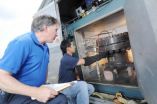(Press-News.org) BEER-SHEVA, ISRAEL, August 2, 2011– A multidisciplinary team at Ben-Gurion University of the Negev has developed a new training method using a desktop webcam to improve ergonomic posture and reduce the risk of musculoskeletal disorders (MSD) among office workers using computers.
According to an article in Applied Ergonomics in the forthcoming issue, a group of 60 workers received both office training and an automatic frequent-feedback system that displayed a webcam photo of a worker's current sitting posture alongside the correct posture photo taken during office training.
The results showed that both training methods provided effective short-term posture improvement; however, sustained improvement was only attained with the photo-training method. Both interventions had a greater effect on older workers and on workers suffering more musculoskeletal pain. The photo-training method had a greater positive effect on women than on men.
"To maintain the effectiveness of an ergonomic intervention for the long term, the intervention should be a continuous process, which includes frequent feedback," the researchers explain. "This new ergonomic method can also result in preventing MSD among workers and reduce financial loss to their employers."
The method of frequent and continuous feedback using photos was found to be effective in improving the sitting posture of computer workers over time. These conclusions have direct implications for many workers in industry and services.
It is recommended that such self-modeling, photo-training software be installed on the worker's computer to provide frequent and long-term feedback. The research suggests that this should be implemented in addition to the conventional office ergonomic intervention that combines specialized ergonomic training and workstation adjustments.
In light of the differences in effect between men and women, combining supplementary feedback targeted to different audiences should be considered. For example, it is recommended to consider adding more detailed feedback that would call attention to deviations from the desired pose for each of the body segments, and evaluate its deferential effect on both genders over the long term.
###The multidisciplinary team of researchers included Dr. Meirav Taieb-Maimon and Prof. Bracha Shapira from BGU's Department of Information Systems Engineering, Prof. Julie Cwikel of the Center for Women's Health Studies and Promotion, Dr. Ella Kordish from occupational health and epidemiology and Dr. Naftali Liebermann from orthopedic surgery at Soroka University Medical Center.
This study was funded by a grant from Israel's Ministry of Industry, Trade and Labor to support the incorporation of video and computer-based technology to address occupational health problems.
Meirav Taieb-Maimona, ,, Julie Cwikelb, Bracha Shapiraa and Ido Orensteina
a Department of Information Systems Engineering, Ben-Gurion University of the Negev, POB 653, Beer Sheva 84105, Israel
b Center for Women's Health Studies and Promotion, Ben-Gurion University of the Negev, POB 653, Beer Sheva 84105, Israel
About American Associates, Ben-Gurion University of the Negev
American Associates, Ben-Gurion University of the Negev (AABGU) plays a vital role in sustaining David Ben-Gurion's vision, creating a world-class institution of education and research in the Israeli desert, nurturing the Negev community and sharing the University's expertise locally and around the globe. With some 20,000 students on campuses in Beer-Sheva, Sede Boqer and Eilat in Israel's southern desert, BGU is a university with a conscience, where the highest academic standards are integrated with community involvement, committed to sustainable development of the Negev. AABGU is headquartered in Manhattan and has nine regional offices throughout the U.S. For more information, visit www.aabgu.org. END
BGU researchers develop webcam tool to improve office worker posture
2011-08-04
ELSE PRESS RELEASES FROM THIS DATE:
Plant biologists dissect genetic mechanism enabling plants to overcome environmental challenge
2011-08-04
Cold Spring Harbor, NY -- When an animal gets too hot or too cold, or feels pangs of hunger or thirst, it tends to relocate – to where it's cooler or hotter, or to the nearest place where food or water can be found. But what about vegetative life? What can a plant do under similar circumstances?
Plants can't change the climate and they can't uproot themselves to move to a more favorable spot. Yet they do respond successfully to changes in environmental conditions in diverse ways, many of which involve modifications of the way they grow and develop.
Plant biologists ...
August 2011 GSA Today science: Understanding Earth's eroding surface with 10Be
2011-08-04
Boulder, Colorado, USA - The August GSA TODAY science article is now online at http://www.geosociety.org/gsatoday/archive/21/8/.
The modification of Earth's surface by erosion is one of the most important geological processes in terms of its impact on society, as well as its influence on the geological record, but geologists have been lacking a well-determined compilation of pre-human rates of erosion. In a groundbreaking compilation of 1528 calculations of surface erosion rates from 80 study areas from all over the world, authors Eric Portenga and Paul Bierman of the ...
Stray-bullet shootings most often harm women and individuals at low-risk for violence
2011-08-04
(SACRAMENTO, Calif.) — In the first nationwide study of stray-bullet shootings, Garen Wintemute, professor of emergency medicine and director of the Violence Prevention Research Program at UC Davis School of Medicine and Medical Center, quantifies mortality and injury among victims of these unexpected events. His research is published as a letter in the August 3 issue of the Journal of the American Medical Association.
"Stray-bullet shootings create fear and insecurity in many communities," said Wintemute. "People stay indoors, don't let their children play outside, and ...
Atmospheric simulations will help NASA interpret data from the Juno Mission to Jupiter
2011-08-04
In August of 2016, when NASA's Juno Mission begins sending back information about the atmosphere of the planet Jupiter, research done by Georgia Institute of Technology engineers using a 2,400-pound pressure vessel will help scientists understand what the data means. The Juno probe is scheduled to be launched August 5 from Cape Canaveral Air Force Station in Florida.
Because Jupiter has been largely unchanged since its formation at the birth of our solar system, scientists hope Juno will resolve unanswered questions not only about the massive planet, but also about how ...
Scientists identify what makes us feel 'bad' when we're sick, how to treat it
2011-08-04
PORTLAND, Ore. — A signaling system in the brain previously shown to regulate sleep is also responsible for inducing lethargy during illness, according to research conducted at Oregon Health & Science University Doernbecher Children's Hospital.
This research is particularly meaningful because it implies that a new class of drugs developed to treat sleep disorders can reverse the inactivity and exhaustion brought on by acute illness. Although the sleep drugs were initially designed to treat narcolepsy, they have the potential to restore energy and motivation in patients ...
IT solution to improve hospital workflow and schedules
2011-08-04
A new customised IT business management system developed by Queensland University of Technology (QUT) researchers and capable of improving the scheduling of resources and workflow in surgical theatres has been successfully demonstrated in a German hospital.
Dr Chun Ouyang, from QUT's Business Process Management (BPM) group, said the system was built based on an automated workflow system known as YAWL, and allowed hospitals to more efficiently manage the co-ordination of expensive surgery-related resources.
The project is being undertaken in partnership with German ...
Science showcase presents psychology's 'hands-on' benefits
2011-08-04
WASHINGTON – The American Psychological Association plans to feature three public demonstrations of psychological science applications, including one that enables "seeing" with one's ears rather than eyes, at the organization's 119th Annual Convention here this week.
The Science Showcase will be open to the public Aug. 5 and 6, near the entrance to the convention exhibits and registration area at the Walter E. Washington Convention Center.
"The science of psychology affects everyone's daily life in ways that most people don't realize," said Steven J. Breckler, ...
National survey reveals widespread mistaken beliefs about memory
2011-08-04
CHAMPAIGN, Ill. — A new survey reveals that many people in the U.S. – in some cases a substantial majority – think that memory is more powerful, objective and reliable than it actually is. Their ideas are at odds with decades of scientific research.
The results of the survey and a comparison to expert opinion appear in a paper in the journal PLoS ONE.
(Before reading further, test your own ideas about memory.)
"This is the first large-scale, nationally representative survey of the U.S. population to measure intuitive beliefs about how memory works," said University ...
Lifestyles of the old and healthy defy expectations
2011-08-04
VIDEO:
People who live to 95 or older are no more virtuous than the rest of us in terms of their diet, exercise routine or smoking and drinking habits, according to...
Click here for more information.
August 3, 2011 — (Bronx, NY) — People who live to 95 or older are no more virtuous than the rest of us in terms of their diet, exercise routine or smoking and drinking habits, according to researchers at Albert Einstein College of Medicine of Yeshiva University.
Their findings, ...
Mayo Clinic finds new bacterium causing tick-borne illness ehrlichiosis in Wis., Minn.
2011-08-04
ROCHESTER, Minn. -- A new tick-borne bacterium infecting humans with ehrlichiosis has been discovered in Wisconsin and Minnesota. It was identified as a new strain of bacteria through DNA testing conducted at Mayo Clinic. The findings appear in the Aug. 4 edition of the New England Journal of Medicine.
Doctors at Mayo Clinic, the Centers for Disease Control and Prevention (CDC), the University of Minnesota, the University of Wisconsin, and state and local health departments say the new species from the Ehrlichia genus can cause a feverish illness in humans. The new bacterium, ...

